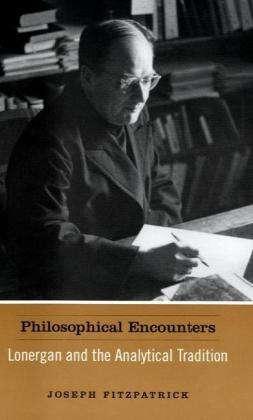Read more
Informationen zum Autor Joseph Fitzpatrick is an independent education consultant and school inspector living in West Yorkshire, England. Klappentext The philosophic thought of Bernard Lonergan often ran contrary to that of his contemporaries in the dominant analytical school. In Philosophical Encounters, Joseph Fitzpatrick delves behind the concepts and terms both Lonergan and the analytical school employed and shared in order to map out clearly where they agreed and where they differed, and indicates where fruitful possibilities exist for dialogue. Fitzpatrick's approach is unique as he sets up direct confrontations - or encounters - between representative authors from the analytical tradition and topics or themes from Lonergan's extensive philosophical corpus. The result is a spirited battle of ideas. There is also a surprising level of agreement, as with, for example. Lonergan and Ludwig Wittgenstein, where both depart from the philosophical pathway marked out by Descartes. Philosophical Encounters defends Lonergan from the kind of attacks typically made against his position and conveys something of the deep influences on Lonergan's mind that help to account for its distinctiveness. Including a very helpful glossary of key terms, this book will be useful not only to those wishing to familiarize themselves with Lonergan's thought but also those wishing to develop an acquaintance with some of the leading lights of the analytical tradition, including Wittgenstein and Bertrand Russell. Zusammenfassung Philosophical Encounters defends Lonergan from the kind of attacks typically made against his position and conveys something of the deep influences on Lonergan’s mind that help to account for its distinctiveness. Inhaltsverzeichnis Introduction PART ONE: THE BASIC POSITION 1 The Structure of Cognition The Process of Coming to Know Something Why Is Doing That Knowing? The Coherence and Correspondence Theories of Truth Ideas Objectivity Consciousness The Fourth Level of Consciousness Intentionality 2 Epistemology: Lonergan and Hume Hume’s Position Lonergan’s Response Consciousness and the Self The Desire to Know The Fourth Level of Consciousness Transcendantal Method 3 The Notion of Belief: Lonergan, Needham, and Hampshire Hume's Notion of Belief Kant's Notion of Belief Hampshire's Notion of Belief 4 Subjectivity and Objectivity: Lonergan and Polanyi Objective Knowledge Tacit Knowing Lonergan's Position Conclusion 5 Problems and Solutions: Lonergan and Russell Lonergan's Notion of the Four Levels of Consciousness Bertrand Russell A Summary of Russell's Philosophical Development Logical Atomism The Nature of Judgment The Theory of Definite Descriptions Behaviorism, Introspection, and Psychologism Russell's and Lonergan's Uses and Notions of Introspection 6 Descartes Under Fire: Lonergan and Wittgenstein Tractatus Logico-Philosophicus Logic From the Tractatus to Philosophical Investigations Philosophical Investigations The Role of Understanding Reacting to the Tradition A Lonerganian Response to Wittgenstein Intentionality From Classical to Historical Consciousness 7 Town Criers of Inwardness: Lonergan and Rorty Rorty's Thesis How the Ocular Metaphor Arose From Descartes to Kant (1) The Analytical Tradition The Way Forward Lonergan's History of Philosophy Galileo From Descartes to Kant (2) A Radical Comparison of Rorty and Lonergan The Roots of Disagreement Rorty and Mind Lonergan and the Subject The Basic Objection to Rorty Conclusion PART THREE: SOME APPLICATIONS...

